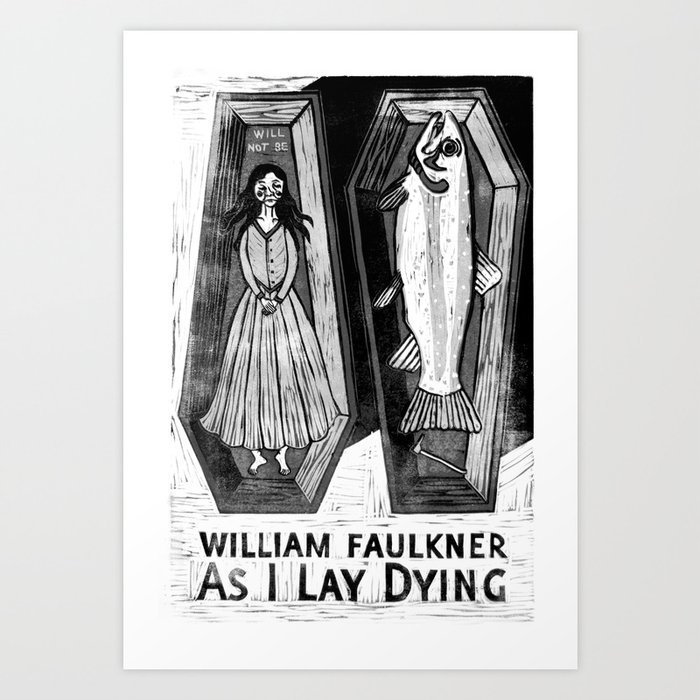 William Faulkner’s novel, As I Lay Dying, is the archetypal quest story, one of the most satisfying and basic plots in the literary canon.
William Faulkner’s novel, As I Lay Dying, is the archetypal quest story, one of the most satisfying and basic plots in the literary canon.William Faulkner’s novel, As I Lay Dying, is the archetypical quest story, one of the most satisfying and basic plots in the literary canon. Like Homer’s The Odyssey
The River as Metaphor for Story
In this post, I will explore how the madcap journey the Bundren family undertakes becomes, like an ever-changing river, a locus of pleasure in the narrative itself. I will show this using the tableau image of Darl drinking the water-filled gourd because the language and tone of this scene is inebriated with warmish cool water riddled with stars, as Darl describes it himself (8). I will then show how the narrative of the water-filled gourd is depicted as sensuous pleasure, the pleasure of the body and the readerly satisfaction of a wavelike release - in the story's end.
The Bundren Family and Their Motives
Oddly enough, the disturbing nature of the story is what makes the novel pleasurable. The motives of every Bundren family member cannot be said to be of the highest moral value. Each and every one of the clan has their own motive: Anse, the father, Cash, the eldest, Jewel, Darl, Vardaman, the youngest, and even Addie, the dead mother, all have strange desires and motives. The fact that Cash, in the novel’s opening scene constructs his mother’s coffin, as she lays dying, in a place where she can obviously see and hear him, is sadistic and disturbing. Who would do this to their own mother? After her husband has gone to work and the last “dirty snuffling nose” had gone to school, what kind of mother would go to a quiet place so she “could be quiet and hate them?” (114). But this is the kind of pleasure that Faulkner is gesturing at in this novel. Cash derives pleasure from constructing the coffin, as is shown in a chapter that lists deliciously how he made the coffin on the bevel (53). His reason? “The animal magnetism of a dead body makes the stress come slanting, so the seams and joints of a coffin are made on a bevel” (53).This pleasure is what makes one reader say, “this book is so funny” and another reader to say, “this book is so sick!” There is a voyeurism ingrained in the reader to want to find out more about this strange, poor family and what compels them to undertake their journey no matter how much you feel or think their journey is depraved. The reader is interested in as many details as can be garnered that can aid in putting the narrative pieces together to understand the journey arc of the novel. This is highly pleasurable. Added to this is the structure of the novel itself. It is told by a series of monologues written in a stream of consciousness style. The reader puts together the pieces of the Bundren’s journey through the varied and limited mental states of the characters. Being inside of the mind of a character provides pleasure, for it is a romp within the mental imagery of another “person”.
Darl as the Central Character
The character of Darl comprises many of the scenes in the book. We are inside Darl’s mind, it seems, more than any other character. Darl seems to be a logical character, but one notices that he takes too many “soft right angles.” There is something sinister in his immediacy with the world around him. Darl emphasizes an unmediated relationship to the world. His conception of the world is dictated solely by sensuosity. Although this will prove to be his demise into insanity, he finds pleasure in what he apprehends to be intuitively sensuous and tangible. He is not interested as much in the concern and care for other human beings as long as they fit into his own sensuous relationship to reality. For example, the scene with the water-filled gourd warrants how Darl’s sensuous response to things around him becomes a fixated locus of pleasure in the narrative arc of the story’s journey.
The Water-Filled Gourd
Around the side of the house, the Bundrens have set a cedar bucket to allow water to sit. It gives the water a sweet taste. As the father Anse points out, water tastes sweetest when it has sat in a cedar bucket for at least six hours, not in metal. It’s “warmish-cool, with a faint taste like the hot July wind in cedar trees smells" (8). Once the water has sat for a time, it is poured into a gourd. What enhances the pleasure for the reader in this scene is how Faulkner situates the text within the narrative structure of the chapter. We are inside Darl’s troubled head here. But we hear his father ask him, “Where’s Jewel?” (8). It is in the interstices of this question that Darl fantasizes about going to the water-filled gourd at night, stirred awake, to see the stars in the water inside the gourd, to be intoxicated into an erotic reverie. But the text reverts back to reality. Back to the scene where his father had asked him about Jewel’s whereabouts. The text brings us in and out of internal journeys into external journeys and out again and back again. This is what gives the novel a heightened sense of journey for the reader. The pleasure of the text is not only Darl’s own bodily pleasure, but the text itself becomes an erogenous zone. The text is a sensuous locus of pleasure as well as the pleasure of the character Darl himself, despite Darl’s own descent into madness.









